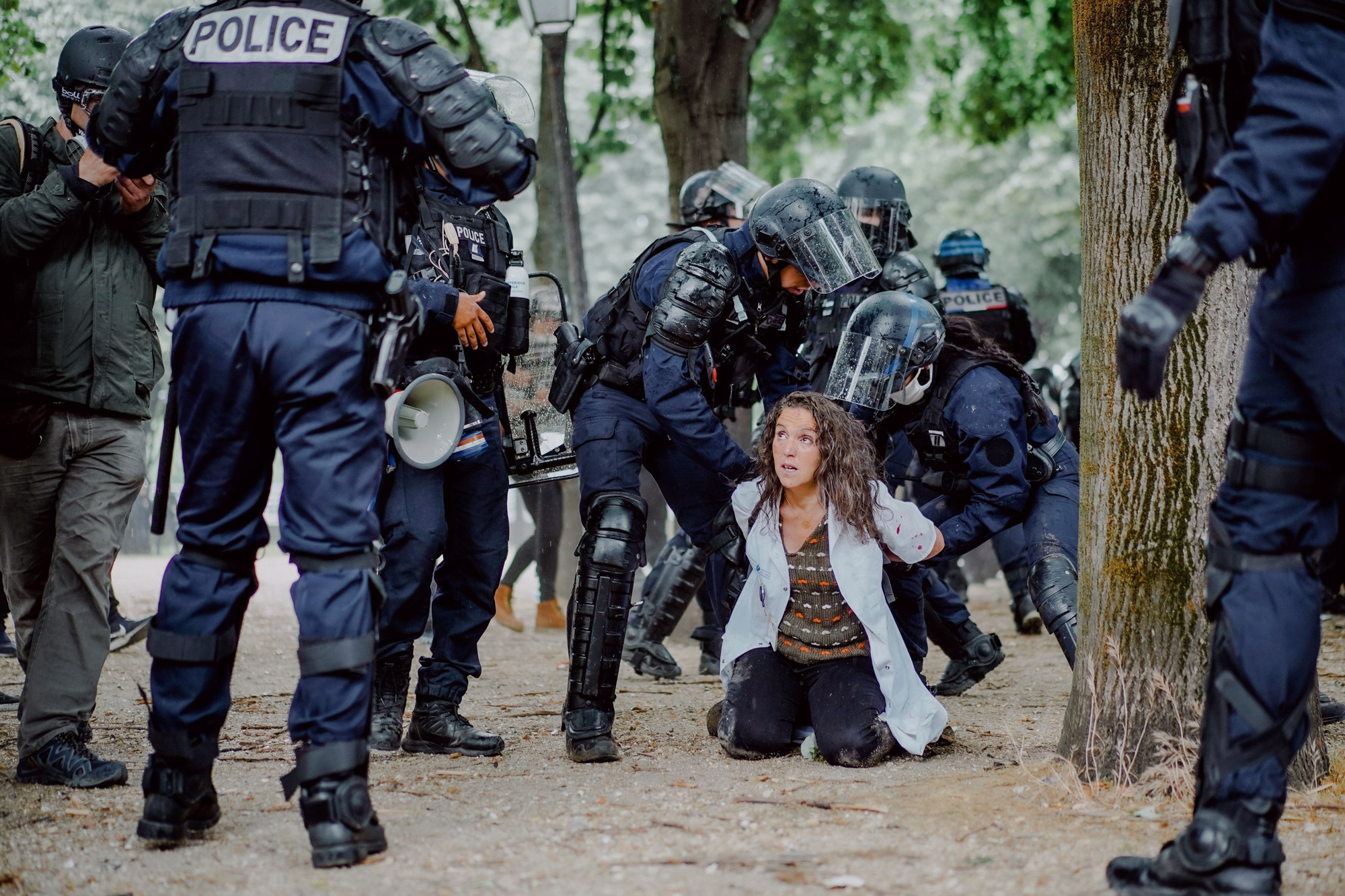
We stand in solidarity with Farida C., a 50-year-old nurse at the hospital Paul-Brousse de Villejuif, who contracted COVID-19 in the course of her efforts to treat patients during the pandemic and now faces charges as a consequence of using projectiles to defend demonstrators from police attacks in Paris last week. Both of these activities demonstrate tremendous courage and self-sacrifice. Fighting the COVID-19 virus and fighting police violence are two aspects of the same program.

On Thursday, June 16, 2020, after months on the front line fighting to save lives threatened by the COVID-19 virus, hospital workers in France took the streets. They wanted to defend their rights and denounce the lack of funds and staff that have plagued French public hospitals for decades.
Whenever a new government comes to power in France, they repeat the same old song: there’s no money for public hospitals. As a result of these policies, health care workers continue to work tremendous amounts of overtime hours with less and less means to offer patients proper treatment.
The COVID-19 pandemic compounded their problems—yet at the same time, the French government was glorifying hospital workers as heroes on the front lines of the war against the virus, making promises to improve their conditions and proclaiming that the government would do everything possible to help hospitals. The authorities even asked people to stand at their windows every night at 8 pm and clap their hands to express solidarity with healthcare workers.
Many hospital workers understood that this new rhetoric was just political theater aimed at manipulating the public. In fact, the government had no real plan to improve their conditions. Rather than words, healthcare workers wanted action, concrete changes that would improve the situation of healthcare workers.

Hippocrates against the hypocrites: a sign in the demonstration of June 16. Picture taken by La Meute, a French photography collective.
On June 16, 2020, tens of thousands of people gathered to show solidarity with hospital workers in the first demonstration that the Parisian authorities had permitted since the beginning of the pandemic. After 30 minutes in the streets, the head of the march entered the Esplanade des Invalides and found the square completely surrounded by police forces.
Confrontations broke out and escalated rapidly as the police began throwing tear gas canisters at the crowd. For more than two hours, intense clashes took place around the square, with anti-riot police units (BRAV) repeatedly charging the crowd to attack demonstrators and carry out arrests. As a consequence of the police violence, many people from a wide variety of backgrounds were compelled to join in the confrontations.
Some hospital workers did so as well. This is the case of Farida C., a 50-year-old nurse at the hospital Paul-Brousse de Villejuif. For the past three months, she has worked 12 to 14 hours a day treating patients whose lives are threatened by COVID-19. While she was saving others’ lives, she contracted the virus as a consequence of the absence of proper equipment to fight the pandemic. This is why she was demonstrating in the streets to demand that the government keep their promises by revaluing hospital workers’ salaries and recognizing the importance of their work. The only answer authorities offered her—and everyone else in the demonstration—was a shower of tear gas, concussion grenades, and rubber bullets.
Just as she had risked her life to save those suffering from COVID-19, she made the difficult choice to defend herself and the other demonstrators from the asymmetric violence of heavily armed riot police. According to her own admission, in response to repeated police attacks, Farida joined others in using projectiles to keep the armored officers at a distance from the people they were trying to injure and abduct.
https://twitter.com/Ab7Media/status/1272920449870172160
In response, a group of police officers brutally arrested her, grabbing her by the hair and dragging her on the ground, claiming that she had thrown projectiles at police lines. While she was face down on the ground, one officer put his knee on her back to immobilize her. She declared that she was suffering from asthma and needed her inhaler, but the cops ignored her pleas. Video footage and photographs show her bleeding from her face after she was handcuffed. When officers were carrying her away to transfer her to a police station, she attempted to shout out her name to other demonstrators so they would know she had been arrested—but the cops tried to silence her by covering her mouth.
She was released after 24 hours in custody. She awaits trial on September 25, charged with “insult to a person holding public authority, rebellion and violence against a person holding public authority.” She faces up to three years in prison and 45,000 euros in fines.
From our perspective, there is no fundamental difference between the courage and self-sacrifice Farida displayed in treating victims of COVID-19 and the courage and self-sacrifice she displayed in defending demonstrators from police attacks. Both the COVID-19 virus and the police as an institution seek to remake the world in their own inhuman image regardless of the cost in lives. We stand in solidarity with nurses and rebels everywhere who block their progress: they are the front lines of the struggle against death and oppression.
The fundamental problem is neither a particular pandemic nor the aggression of particular police officers. It is the interlocking hierarchies of capitalism and the state, which systematically endanger entire populations while concentrating control of the resources necessary to survival in the hands of a self-interested few.
Freedom for Farida!
Fighting the police is healthcare, too!
You can watch an interview with Farida here.



